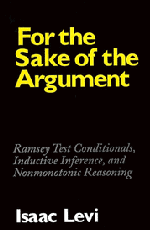 For the Sake of the Argument
For the Sake of the Argument Book contents
- Frontmatter
- Contents
- Preface
- For the Sake of the Argument
- 1 Introduction
- 2 Unextended Ramsey Tests
- 3 Modality without Modal Ontology
- 4 Aspects of Conditional Logic
- 5 Nonmonotonicity in Belief Change and Suppositional Reasoning
- 6 Inductive Expansion
- 7 Defaults
- 8 Matters of Degree
- 9 Normality and Expectation
- 10 Agents and Automata
- Notes
- Bibliography
- Name Index
- Subject Index
1 - Introduction
Published online by Cambridge University Press: 04 May 2010
- Frontmatter
- Contents
- Preface
- For the Sake of the Argument
- 1 Introduction
- 2 Unextended Ramsey Tests
- 3 Modality without Modal Ontology
- 4 Aspects of Conditional Logic
- 5 Nonmonotonicity in Belief Change and Suppositional Reasoning
- 6 Inductive Expansion
- 7 Defaults
- 8 Matters of Degree
- 9 Normality and Expectation
- 10 Agents and Automata
- Notes
- Bibliography
- Name Index
- Subject Index
Summary
Supposing and Believing
Keeping a firm grip on the difference between fact and fiction entails much more than distinguishing between what is judged true, what is judged false, and what hangs in suspense. Any agent who has a clear “sense of reality” distinguishes between what he or she fully believes to be true and what he or she supposes to be true for the sake of the argument. But both what is fully believed and what is supposed furnish the basis for a tripartite distinction between what is judged true, what is judged false, or what hangs in suspense.
Given an agent's state of full belief at a given time, some propositions are judged possibly true because they are not ruled out by the state of full belief and others are judged impossible. In this epistemic sense of serious possibility, h is judged true relative to the agent's state of full belief K if and only if ∼h is not a serious possibility, h is judged false if and only if ∼h is judged true, and the question of the truth of h hangs in suspense if and only if both h and ∼h count as serious possibilities.
If a would-be investor is uncertain as to whether the government will propose an investment tax credit for long-term investments in U.S. firms, the uncertainty will have some relevance to the investor's conclusion as to how to make investments.
- Type
- Chapter
- Information
- For the Sake of the ArgumentRamsey Test Conditionals, Inductive Inference and Nonmonotonic Reasoning, pp. 1 - 17Publisher: Cambridge University PressPrint publication year: 1996
- 1
- Cited by


